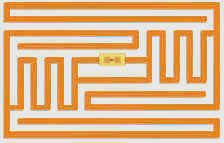Many in the supermarket industry look forward to the days when all items have RFID tags. These tiny transmitters would essentially eliminate the need for check out registers, dramatically cutting stores’ labor costs.
A new kind of RFID tag that University of Manchester (UK) researchers are developing could help reduce waste. The tags would be able to sense whether items have been refrigerated properly, and adjust expiration dates accordingly.
This provides some real hope for trimming supermarket food waste, because:
Currently, best-before dates set by manufacturers are based on worst-case assumptions about the condition of our food between harvest and consumption. Most food is perfectly okay to eat days after its displayed best-before date.’
Implementing RFID tags in food packaging is a question of when, not if. Their adoption will occur when they’re cheap enough, which could be some time.
Yet for expiration date purposes, you’d only need one RFID tag per palette or box of food, not for each unit of sale. In that case, hopefully this kind of RFID tagging (and not the Big Brother version) will catch on quickly. Then, “use by” dates will be much more accurate and less food will be wasted at stores and in homes.
3 Comments